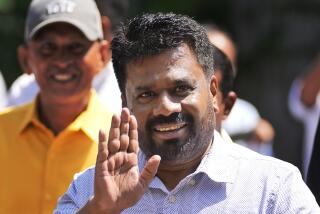Sri Lanka Peace Effort Severely Damaged in Fatal Blast : Asia: Despite death of opposition candidate in bombing, Nov. 9 national election still seems to be on.
- Share via
NEW DELHI — Once again, a suicide bomber may have blown to pieces chances that peace can easily be restored to violence-racked Sri Lanka.
Police and military investigators said they suspect a woman with a bomb hidden inside her jacket or a man on crutches wearing explosives on a belt in the massacre early Monday of the top opposition candidate for president, Gamini Dissanayake, and more than 50 officials and supporters of his party.
Both of those suicide-bombing techniques have been used in the past in attacks blamed on Tamil separatists, who are also widely blamed for the latest attack.
The blast, which occurred just after midnight, sprayed people attending a Sunday night political rally in the capital, Colombo, with ball bearings or pellets.
“Violence has struck again as the nation moves toward peace and normalcy,” said Prime Minister Chandrika Kumaratunga, of the leftist People’s Alliance, who had faced a serious challenge from Dissanayake in her campaign for the presidency.
However, with the election little more than two weeks away, Commissioner of Elections R. K. Chandrananda De Silva decreed that the Nov. 9 polling should go forward as scheduled.
In accordance with Sri Lankan law, he gave Dissanayake’s United National Party three days to submit the name of a new candidate to replace the UNP’s flamboyant 52-year-old standard-bearer.
In a telephone interview, De Silva said he doesn’t think the act of mass political murder presages a general resurgence of violence that would make a free or fair election impossible in the island nation off India’s southern tip.
“This sort of thing tends to shake up the people and make them feel the futility of such kinds of violence,” De Silva said.
Not all government officials agreed, evidently. President Dingiri Banda Wijetunga, denouncing the deaths of his fellow UNP members as a “cowardly and dastardly act,” reimposed an 11-year-old state of emergency that had been lifted only recently.
The government Monday also canceled a second round of peace talks with the Tamil rebels that were scheduled to begin that day in Jaffna, 185 miles north of Colombo. Officials said the talks are postponed indefinitely until an inquiry establishes who was behind Dissanayake’s murder.
Fears were widespread that outraged members of the island nation’s majority Sinhalese community might seek vengeance on minority Tamils.
“We’re all waiting to see what happens,” said Neelan Tiruchelvam, an ethnic Tamil, who is director of the Colombo-based International Center for Ethnic Studies. “The country is in a state of shock.”
Since 1983, in an ethnic war that has cost more than 30,000 lives, the Liberation Tigers of Tamil Eelam have been waging a fierce struggle for a separate homeland in the north and east for the largely Hindu Tamils, who make up about 18% of the predominantly Buddhist population of 17 million.
Across the capital on Monday, troops set up checkpoints and searched arriving vehicles. However, as night fell, no new incidents of violence were reported.
“So far, so good,” Information Minister Dharmsasiri Senanayake said at an evening briefing.
The powerful explosion during an election rally in a marketplace of Colombo’s Grandpass district killed the candidate, 17 members of the presidential security division who had been assigned to protect him, and several top party officials, including UNP General Secretary Gamini Wijesekara, two former ministers and the party’s top organizer for Colombo, officials said.
Hundreds of other people suffered cuts and bruises, and 75 were hurt seriously, police said. The death toll was put at 52 as of Monday evening, though hospital officials said some bodies were so badly maimed that an exact count was difficult.
Witnesses said the explosion occurred about 10 minutes after midnight, after Dissanayake, conscious of the hour, jokingly concluded a campaign speech by saying, “Instead of saying good night, I wish you all a very good morning.” He turned to return to his chair.
“There was a big flash and a huge explosion; when I looked up there was no one on the stage,” remembered a woman who escaped unhurt, but whose skirt was smeared with the blood of others.
Investigators said many of the victims were struck in their heads or upper bodies by flying metal pellets or shrapnel.
Kumaratunga, whose father and husband also were assassinated, promised that those responsible for murdering her opponent would be brought to justice.
Some Sri Lankans, however, were certain to put some of the blame on the prime minister and her government for the much softer line she has taken toward the rebels since her People’s Alliance coalition won the Aug. 16 parliamentary elections and ended the UNP’s 17-year hold on power.
“This could rebound against her if she is seen as having stroked the head of the Tigers,” a senior Sri Lankan journalist said.
More to Read
Sign up for Essential California
The most important California stories and recommendations in your inbox every morning.
You may occasionally receive promotional content from the Los Angeles Times.












